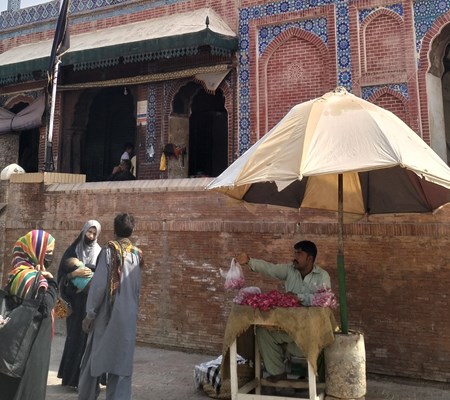Rituals of Muslim Women in South Asia: an Interview with Award-Winning Researcher Dr Sana Iqbal

Dr Sana Iqbal is a Research Associate in South Asian studies at the IIS. Dr Iqbal works at the intersections of South Asian studies, gender, and Islam. She was recently awarded the second prize by the prestigious Rubina Saigol Research Award in Pakistan for her paper “From Mansplaining to Manspreading: Why the employment of women alone is insufficient for their empowerment.” The paper was based on her PhD research conducted in Pakistan.
Please tell us a bit about your research
"In my role at the IIS, I explore some fascinating research areas, such as studying the content of Satpanth ginans (religious lyrical literature) and Sufi poetry from South Asia using an ecocritical lens. This particular textual study, which I conducted last year, is very relevant to the current climate crisis we are confronting. It helped to unpack how such devotional literature allows us to study the relationship between humans and the planet. The literature is not limited to animal symbolism but also advocates an eco-sensitive approach to the consumption of natural resources. I found that ecocritical readings of the Indic-Sufi literature can provide grounds for striking a balance between worldly and spiritual lives, as well as between ethical/spiritual consciousness and environmental stewardship. The poetry situates humankind as attuned to and a conserver of both material and spiritual worlds.
I am currently researching female-centred rituals among the mystical and esoteric traditions from South Asia. I am studying the experiences and voices of female devotees at Sufi shrines in Pakistan, with a particular focus on using a feminist lens to understand how they assert their gendered agency through these rituals and practices. The study is based on my recent fieldwork in Punjab, where I also had an opportunity to visit local archives and libraries and benefit from primary sources in Urdu."
What is the Rubina Saigol Research Award and what does winning mean to you?
"The award is intended to honour and carry on the work of Rubina Saigol, a widely respected Pakistani feminist scholar, educationalist and women’s rights activist who authored and edited several books and papers in English and Urdu. It aims to encourage continued research on the themes explored in her scholarly work: gender, education, nationalism, the state, ethnicity, religious radicalism, terrorism, feminism and human rights. Winning the award was a huge honour for me since the peer review board shortlisted only seven papers from a total of 150 academic papers. Once the board finalises its feedback, the winning papers will be published by the Lahore Education and Research Network (LEARN). I am keen to contribute to research on Pakistan through my publications and conference presentations."
Can you tell us about your winning paper?
"The paper drew on my primary research conducted in Karachi, which displayed how corrupted urban governance and poor planning, often seen to harm the economy, also magnify the impact of patriarchy on the lives of ethnic minority women. Based on responses shared by 30 Gujarati female participants, I argued that their autonomy was viewed as threatening not only by their families but also by larger society. As a result, they had to operate in a hostile environment that granted them minimal agency due to their gender and ethnic positionings. The layers of disadvantages caused by their intersecting identities were representative of the socio-economic challenges faced by many other educated and capable middle-class women, despite their financial independence. My research showed that there was thus not a linear relationship between employment and empowerment, which requires looking at the contextually relevant indicators of gendered social exclusion."
What are your hopes and aspirations as an early career researcher?
"I want to continue to pursue my career in research at the Institute. I believe research is an iterative process, and I enjoy it most when it involves direct interaction with other researchers as well as people and places. I was recently invited to present my paper “Geography, Governance and Gender: Lives of Minority Ethnic Women and the Informal Economy in Karachi” at The Pakistan Conference: 75 Years of Independence organised by the South Asia Institute at Harvard University in November 2022. This experience afforded me a chance to liaise with other like-minded researchers on co-authoring publications and harness my potential to advocate for cultural change around the complex and evolving area of gender and minority studies in the Global South in front of an informed audience.
I am passionate about exploring the gender aspects of religious performances in South Asia through its literature, media, and ethnographic methods. I am an ardent supporter of doing research that is relevant to the communities in South Asia. Apart from this, being the first person in my family to get a PhD, I would like to support other emerging researchers in their journeys too."
